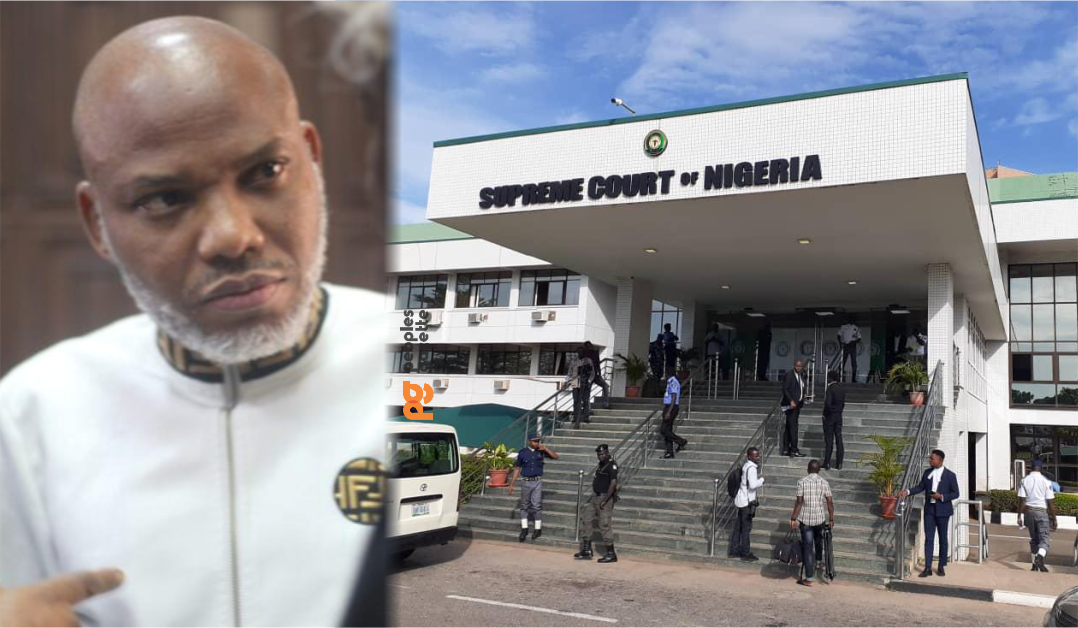ABUJA, Nigeria — A senior member of Nnamdi Kanu’s legal team has denounced the Nigerian Supreme Court’s December 2023 ruling in the high-profile case of Federal Republic of Nigeria v. Nnamdi Kanu (SC/CR/1364/2022), describing it as “a travesty of justice” and “a historic judicial error.”
Barrister Njoku Jude Njoku, speaking on behalf of the Mazi Nnamdi Kanu Global Defence Consortium, said the apex court’s reversal of an earlier Court of Appeal judgment that cleared the Indigenous People of Biafra (IPOB) leader of all terrorism-related charges was not only unconstitutional but delivered per incuriam—a legal term indicating the court ignored binding precedent.
Kanu, the embattled IPOB leader and separatist figure, was discharged by the Court of Appeal on October 13, 2022, which ruled that the charges against him were void due to his controversial rendition from Kenya to Nigeria. That decision was heralded by supporters as a legal vindication. However, the Supreme Court overturned the ruling on December 15, 2023, citing that the lower court had failed to determine Kanu’s guilt or innocence on the merits.
But Njoku contends that the Supreme Court erred in law by relying on a stay of execution granted by the Court of Appeal on October 28, 2022—a move he argues lacks legal grounding in criminal proceedings.
“The Court of Appeal’s discharge was based on lack of jurisdiction. That ends the matter. You cannot suspend a nullity,” Njoku told reporters in Abuja. “Under Nigerian law, once a court lacks jurisdiction, everything done thereafter is void and cannot be revived or retried.”
Citing landmark cases such as Madukolu v. Nkemdilim (1962) and Abacha v. State (2002), Njoku emphasized that discharges on jurisdictional grounds are not provisional and cannot be reversed to facilitate a retrial.
“A discharge for want of jurisdiction is final. It is not a placeholder,” he said, warning that the apex court’s approach effectively erodes Nigeria’s constitutional protection against double jeopardy.
Under Section 36(9) of the 1999 Constitution, no person may be tried again for an offense for which they have already been acquitted. Njoku insists that by treating the Court of Appeal’s discharge as non-final, the Supreme Court has effectively “hollowed out” that constitutional safeguard.
“This logic is constitutionally dangerous,” he warned. “It reduces jurisdiction—a foundational legal principle—into a technicality that can be sidestepped.”
Legal observers say the ruling has set a significant precedent in Nigeria’s criminal jurisprudence. The Supreme Court justified its reversal by arguing that the matter should have been decided based on its merits, not procedural grounds—a stance that Njoku and others believe could upend longstanding principles in criminal law.
Further complicating the matter is the international dimension. Njoku pointed to a June 24, 2023 ruling by the High Court of Kenya, which declared Kanu’s abduction and rendition to Nigeria unlawful. That decision cited violations of the African Charter on Human and Peoples’ Rights and the International Covenant on Civil and Political Rights.
“The Court of Appeal rightly concluded that the Nigerian state had divested itself of jurisdiction by violating international law,” Njoku said. “The Supreme Court’s refusal to acknowledge this only deepens Nigeria’s legal and diplomatic exposure.”
He warned that Nigeria risks facing further international scrutiny and possible sanctions by persisting with what he described as an “unlawful retrial.”
The ongoing criminal case against Kanu is currently before the Federal High Court in Abuja. On June 20, 2025, the prosecution closed its case after calling five witnesses from the Department of State Services (DSS). Kanu’s defense team, led by former Attorney General Kanu Agabi (SAN), has filed a no-case submission, arguing that the prosecution failed to establish a prima facie case. Justice James Omotosho is expected to rule on the submission on October 10.
Despite the proceedings, Njoku insists the trial should not even be taking place.
“This entire proceeding is tainted,” he said. “The Supreme Court’s per incuriam judgment and the unconstitutional stay of execution mean this trial has no legal foundation. It is a nullity.”
He concluded with a stern warning:
“The decision in FRN v. Nnamdi Kanu is a judicial mistake of historic proportions. By prioritizing form over substance, the Supreme Court has created a precedent that threatens the integrity of Nigerian law and exposes the nation to global ridicule.”
As Kanu’s legal battle continues, the broader implications of the Supreme Court’s ruling—for Nigerian constitutional law, international human rights norms, and judicial independence—remain subjects of intense debate both at home and abroad.
